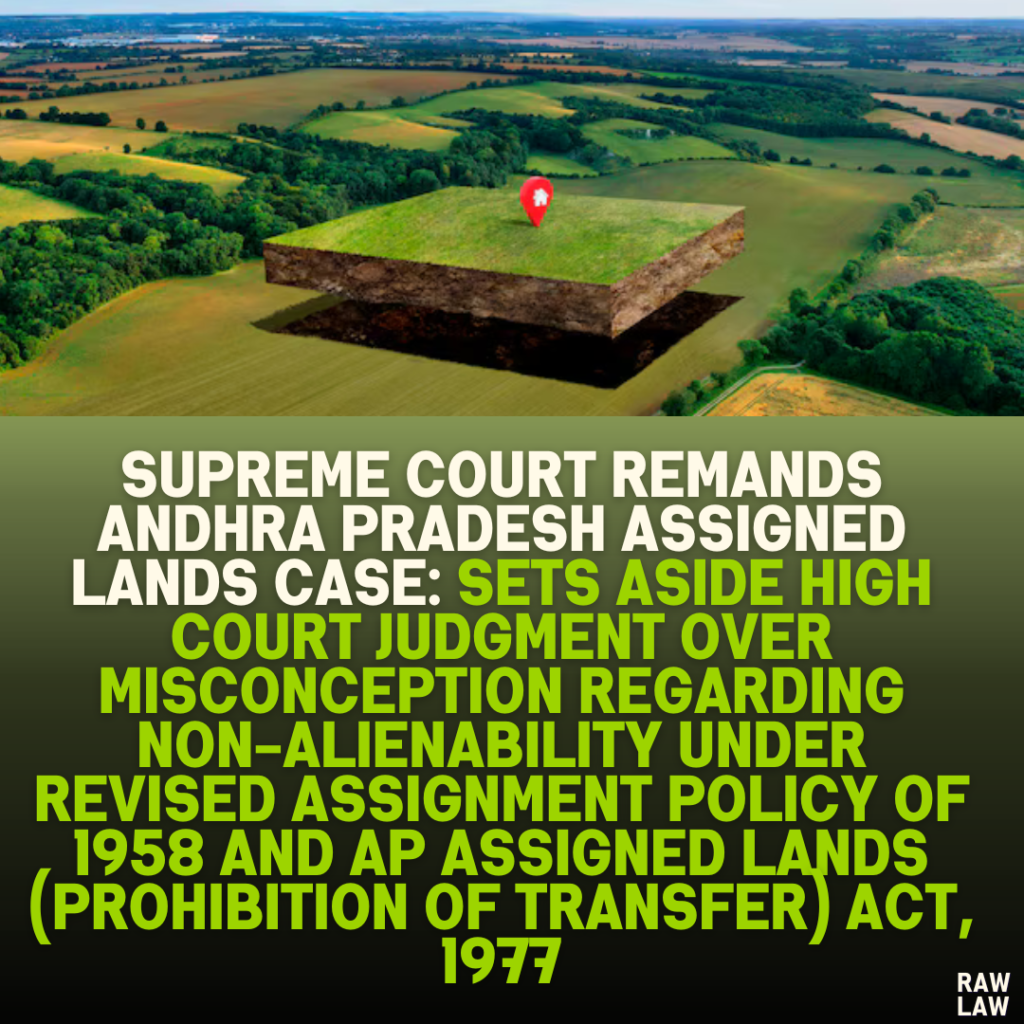Court’s Decision:
The Supreme Court of India set aside the common judgment of the Andhra Pradesh High Court dated 02.09.2008 in a series of writ petitions and appeals. It remanded the matter to the High Court for fresh consideration, emphasizing the need to assess the facts in light of the revised assignment policy of 1958, the AP Assigned Lands (Prohibition of Transfer) Act, 1977 (AP AL (PoT) Act), and relevant Supreme Court precedents. The High Court was directed to adjudicate the cases expeditiously, within six months.
Facts:
- Background:
The case revolved around lands in Khanamet village (Survey Nos. 37 and 38/1), assigned under government policies, specifically the revised assignment policy of 1958. The Revenue Divisional Officer of Chevella and other government authorities initiated proceedings against land purchasers and assignees for violating Section 3 of the AP AL (PoT) Act, 1977, which prohibits the transfer of assigned lands. - Petitions Filed:
Several writ petitions were filed challenging the orders passed by the Revenue Divisional Officer and Mandal Revenue Officer. These authorities claimed that the lands were government-assigned, free of market value, and bound by conditions of non-alienability. - Petitioners’ Contention:
The writ petitioners claimed that the lands were originally assigned on market value and that sale transactions were validated under Sections 47 and 50-B of the Telangana Tenancy Act. They argued that multiple transactions and ownership transfers occurred since 1965, legitimizing their ownership. - High Court’s Decision:
The High Court allowed the petitions, holding that since permissions were granted under Section 47 and validated under Section 50-B, the lands were considered alienable and not subject to the restrictions of the AP AL (PoT) Act.
Issues:
- Whether lands assigned under the Laoni Rules, 1950, or revised policies of 1958 could be resumed under the AP AL (PoT) Act, 1977.
- Whether permissions and validations under the Telangana Tenancy Act could override conditions of non-alienability imposed under government assignment policies.
Petitioner’s Arguments:
The petitioners argued:
- The lands were not “assigned lands” under the AP AL (PoT) Act as they were purchased through registered sale deeds with permissions under Section 47.
- Validations under Section 50-B confirmed the legality of the transactions, and subsequent mutations legitimized the ownership transfers.
- The prohibition of transfer did not apply as the lands were assigned on the collection of market value.
Respondent’s Arguments:
The appellants (State and government authorities) contended:
- The lands were assigned without market value under the revised assignment policy of 1958, which imposed non-alienability conditions.
- Sections 47 and 50-B of the Telangana Tenancy Act applied to patta lands, not government-assigned lands.
- Transfers of assigned lands were void as they violated Section 3 of the AP AL (PoT) Act.
Analysis of the Law:
- AP AL (PoT) Act, 1977:
Prohibits the transfer of assigned lands and mandates their resumption by the government if transferred in violation of its provisions. - Telangana Tenancy Act:
Sections 47 and 50-B allow permissions and validations for sale transactions but primarily apply to patta lands, not government-assigned lands with non-alienability conditions. - Revised Assignment Policy of 1958:
Imposed strict non-alienability conditions for lands assigned without market value, ensuring that such lands could not be transferred.
Precedent Analysis:
- Government of Andhra Pradesh v. Gudepu Sailoo (2000):
Held that assigned lands under non-alienability conditions cannot be transferred or validated through sale deeds. - Yadaiah v. State of Telangana (2023):
Reiterated the enforcement of non-alienability conditions under the revised assignment policy of 1958, making transfer of such lands void.
Court’s Reasoning:
- Misconception in High Court Judgment:
The Supreme Court found that the High Court presumed, without evidence, that the lands were assigned on market value. The revised assignment policy and its non-alienability conditions were not adequately considered. - Application of Precedents:
The High Court failed to apply binding judgments like Gudepu Sailoo and Yadaiah, which upheld non-alienability in similar cases. - Importance of Assignment Policy:
The Court emphasized that permissions under Sections 47 and 50-B could not override conditions imposed by the revised assignment policy.
Conclusion:
The Supreme Court set aside the High Court’s judgment, remanding the case for fresh adjudication. The High Court must reassess the petitions by:
- Considering the revised assignment policy of 1958.
- Evaluating the evidence regarding the nature of the assignments.
- Applying relevant precedents from the Supreme Court.
The High Court was directed to resolve the cases expeditiously within six months.
Implications:
- Reinforces the supremacy of government assignment policies over permissions granted under other laws.
- Highlights the binding nature of precedents in adjudicating land-related disputes.
- Strengthens the enforcement of non-alienability conditions to prevent misuse of government-assigned lands.




Pingback: Rajasthan High Court Grants Anticipatory Bail Under Section 482 BNSS: "No Incriminating Evidence Against the Petitioner to Reflect Criminal Conspiracy," Protects Liberty Amid Allegations - Raw Law
Pingback: Delhi High Court Upholds Dismissal of Suit Challenging Family Settlement: Bars Fresh Suit Under Order XXIII Rule 3A CPC and Affirms Finality of 2007 Consent Decree - Raw Law